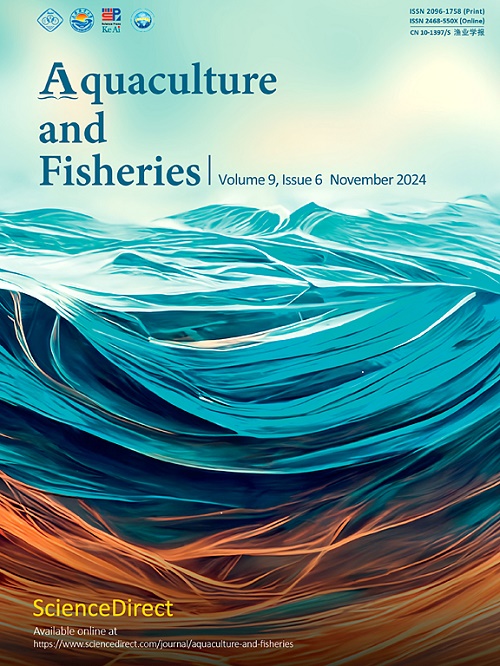Synergistic effects of Recirculating Aquaculture System (RAS) with combination of clear water, probiotic and biofloc technology: A review
Q1 Agricultural and Biological Sciences
引用次数: 0
Abstract
Recirculating Aquaculture System (RAS) is introduced in aquaculture farming industry to reduce water resource utilization, efficient the energy and land uses, and also help minimalize the water exchange. This system enables utilization of unsuitable land and promotes a sustainable environment in aquaculture industry. Furthermore, this technology has been established and proved efficient in monitoring the aquatic animal condition subsequently helps in maintaining the water quality and help remove solid particle wastes from the aquaculture treatment. As today, RAS has been developed with more effective technologies such as the use of UV irradiation, solid capture, protein skimmer and also provided with highly techno bio-filtration set. Basically, this system was applied for broodstock maturation, nursery phase, and grow-out production. In this review article, we provide an overview of RAS between the clear water, probiotic, and biofloc technology, and the advantages of its combination. Even though RAS and biofloc is two different parallel system, the application of the probiotic and biofloc in the semi-RAS application system is intense to be investigated. The synergistic effect of RAS using this combination towards high yield aquaculture production will be highlighted in this review paper. Expectantly this review paper will generate awareness and useful information on the RAS application in the aquaculture system operation with help in maximize the impact to the aquaculture yield production.
结合清水、益生菌和生物絮团技术的循环水养殖系统(RAS)的协同效应:综述
在水产养殖业中引入循环水养殖系统(RAS)是为了减少水资源的使用,提高能源和土地使用效率,并有助于最大限度地减少水交换。该系统可以利用不适宜的土地,促进水产养殖业的可持续发展。此外,这项技术已经建立并被证明能有效监测水生动物的状况,从而有助于保持水质,并有助于去除水产养殖处理过程中产生的固体颗粒废物。如今,RAS 已发展出更有效的技术,如使用紫外线照射、固体捕获、蛋白质撇渣器,还提供了高技术生物过滤装置。基本上,该系统适用于鱼苗成熟、育苗阶段和生长期生产。在这篇综述文章中,我们概述了清水、益生菌和生物絮团技术之间的 RAS 及其组合优势。尽管 RAS 和生物絮团是两个不同的并行系统,但益生菌和生物絮团在半 RAS 应用系统中的应用仍有待深入研究。这篇综述论文将强调在 RAS 中使用这种组合对高产水产养殖生产的协同效应。希望这篇综述论文能提高人们对 RAS 在水产养殖系统运行中的应用的认识,并提供有用信息,帮助最大限度地提高水产养殖产量。
本文章由计算机程序翻译,如有差异,请以英文原文为准。
求助全文
约1分钟内获得全文
求助全文
来源期刊

Aquaculture and Fisheries
Agricultural and Biological Sciences-Aquatic Science
CiteScore
7.50
自引率
0.00%
发文量
54
审稿时长
48 days
期刊介绍:
 求助内容:
求助内容: 应助结果提醒方式:
应助结果提醒方式:


